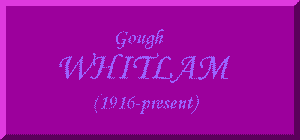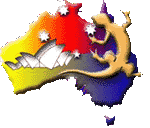|
        |
Australia's Prime Minister elected 1972, in an election that marked the beginning of a new era in Australian history and awakened "a rare feeling of national self-respect." Labor's three stated aims were to promote equality, to involve the people in decision-making processes and to liberate the talents and uplift the horizons of the Australian people. Whitlam's term as prime minister ended in 1975 when he was dismissed by the Governor-General-his dismissal is one of the most controversial issues in Australia's history. It ended three years of extensive social and cultural reform. Edward Gough Whitlam was born on 11 July 1916 in Kew, Melbourne of affluent parents. After graduating from the University of Sydney he became a practicing lawyer, joining the Royal Australian Air Force (R.A.A.F.) in December 1941. In 1942 he married Margaret Dovey with whom he had four children. He joined the Labor Party in 1945. After standing unsuccessfully for a local and a state election, he won the Federal seat of Werriwa in 1952. The talents of this newcomer were soon recognised and he became Labor's deputy leader in 1960 under Calwell. Whitlam challenged Calwell for the leadership in 1963 but did not succeed until Calwell lost the election to Holt in 1966. Once leader, Whitlam set about democratising Party procedures and uniting the left and right factions. Labor's dynamic "It's Time" election campaign against a divided Coalition resulted in an easy win. The election was only for the House of Representatives-and the Senate was still hostile. Before the election euphoria had died down, Whitlam flew to Canberra, where he and his deputy Lance Barnard were sworn in as a two-man Cabinet. Within two weeks conscription was abolished, draft resisters were released from jail and troops withdrawn from Vietnam, the British New Year's Honour list was abolished, tariffs on imported goods drastically reduced and the Australian dollar revalued. In foreign affairs, the People's Republic of China was recognised and steps were taken to grant Papua New Guinea its independence. Visits by racially selected sporting teams were banned and the Government took a tough line on South Africa and Rhodesia (now Zimbabwe). Whitlam was less subservient than Holt to foreign policy directions from the USA. He was reluctant to support the struggle for independence of the tiny Portuguese Colony of East Timor, even when Indonesia used the turmoil in Lisbon to annex East Timor. Whitlam's election commitments were far reaching and diversified, promising improvement and extension of social services, equality for all citizens, an independent foreign policy and the end to Australia's cultural cringe. Aborigines were given assistance and land rights were granted in the Northern Territory. In education, preschool education was boosted, university fees abolished, spending on teacher training increased and the Tertiary Education Assistance Scheme (TEAS, now called Austudy) was introduced. Women were awarded equal pay for equal work and maternity leave provided. Four weeks annual leave was granted for public servants and the private sector followed suit. Race was no longer a criterion for immigration. The Australia Council and Australian Film and Television School were founded for development and promotion of the arts. Under eighteen voting was introduced and a universal health insurance scheme, Medibank, would ensure that all Australians had access to health services. In all, there were 507 pieces of legislation enacted. Many of Australia's present institutions began in the Whitlam era: Women's Electoral Lobby; the Australian Heritage Commission; Law Reform Commission; National Sewerage Program; Industries Assistance Commission; Australian National Railways Commission; FM and community radio licensing; and the Prices Justification Tribunal. Money and skilful administration were needed to implement these bold reforms. The Government pressed ahead with its social reforms regardless of the effects on inflation. The world economy deteriorated, with the oil crisis of late 1973 adding to the inflationary spiral. Unemployment began to climb. It has been said that Whitlam was trying to do too much too quickly. The Senate forced a double dissolution in April 1974 over vital supply bills (to cover government expenditure between July and November). The result was a Labor victory in the May election but with a reduced minority and still no control of the Senate. In August 1974 Whitlam held a joint sitting of both houses, the first of its kind in Australia, to pass six bills previously rejected by the Senate. After the 1974 elections the economy began to deteriorate. Two major scandals rocked the government. In December 1974 treasurer Jim Cairns appointed Junie Morosi as his Office Coordinator in spite of her lack of public service background. The press were relentless in their attacks and Morosi did not take up the appointment. Three weeks later she took up a public relations job on Cairn's staff, raising questions about improper relationships. By far the most serious scandal was the Loans affair. The Minister for Minerals and Energy, Rex Connor, embarked on a scheme "to buy back the farm," curtailing foreign ownership of Australia's mining industry. Instead of proceeding through the regular channel of the Loans Council, Connor tried to raise the money through Middle-Eastern financier Tirath Khemlani. When it became obvious that Khemlani could not finance the deal the commission was revoked. Despite denials from Whitlam that the matter was closed, both Jim Cairns and Rex Connor went on trying to raise money. With ministerial sackings and the Loans affair, the Government was in trouble by October 1975. Whitlam's reputation as "the tourist prime minister" did not do him good. He was overseas when three major disasters occurred-the Darwin Cyclone, the Brisbane Floods and the Hobart Bridge collapse. When Malcolm Fraser refused to pass the supply bills in the Senate until a House of Representatives election was called, Whitlam refused and an impasse began. Governor-General John Kerr intervened and sent for Whitlam. On hearing that Whitlam did not intend to hold an election for the House of Representatives, Kerr handed Whitlam his letter of dismissal on 11 November 1975. Fraser was asked to form a government. The nation was shocked. But the people did not "maintain their rage" until polling day. Whitlam remained leader of the ALP but after losing the 1977 elections he stood down as leader and resigned from Parliament in July 1978. He was appointed Ambassador to UNESCO in 1983 and has since been a supporter of the arts. Copyright unknown
|
|
|
|
[ Virtual
Australia | The
World We Live In | The
Things We Do ]
Problems/Broken Links can be reported
to
All text and
graphics unless otherwise stated are ©1998-2000 Kim Holden, Virtual Australia.
|

![[Visit Oska]](../../images/oska003.gif)
